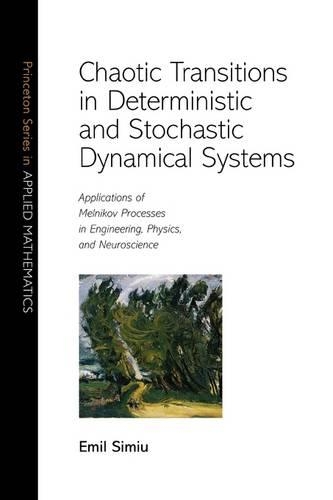
Chaotic Transitions in Deterministic and Stochastic Dynamical Systems: Applications of Melnikov Processes in Engineering, Physics, and Neuroscience
(Paperback)
Publishing Details
Chaotic Transitions in Deterministic and Stochastic Dynamical Systems: Applications of Melnikov Processes in Engineering, Physics, and Neuroscience
By (Author) Emil Simiu
Princeton University Press
Princeton University Press
8th September 2009
United States
Classifications
Tertiary Education
Non Fiction
515.352
Physical Properties
Paperback
240
Width 152mm, Height 235mm
340g
Description
The classical Melnikov method provides information on the behavior of deterministic planar systems that may exhibit transitions, i.e. escapes from and captures into preferred regions of phase space. This book develops a unified treatment of deterministic and stochastic systems that extends the applicability of the Melnikov method to physically realizable stochastic planar systems with additive, state-dependent, white, colored, or dichotomous noise. The extended Melnikov method yields the novel result that motions with transitions are chaotic regardless of whether the excitation is deterministic or stochastic. It explains the role in the occurrence of transitions of the characteristics of the system and its deterministic or stochastic excitation, and is a powerful modeling and identification tool. The book is designed primarily for readers interested in applications. The level of preparation required corresponds to the equivalent of a first-year graduate course in applied mathematics. No previous exposure to dynamical systems theory or the theory of stochastic processes is required. The theoretical prerequisites and developments are presented in the first part of the book. The second part of the book is devoted to applications, ranging from physics to mechanical engineering, naval architecture, oceanography, nonlinear control, stochastic resonance, and neurophysiology.
Reviews
"Highly readable, elegant, and concise... Emil Simiu has succeeded in putting together a highly stimulating book that proposes a promising, unifying approach to various aspects of chaos theory. While encompassing a wide swath of topics, traditionally found only on scattered sources, the book is succinctly written, exhibiting a quality reserved to the best of review works."--Daniel ben-Avraham, Journal of Statistical Physics
Author Bio
Emil Simiu is a NIST Fellow, National Institute of Standards and Technology, and Research Professor, Whiting School of Engineering, The Johns Hopkins University. A specialist in flow-structure interaction, he is the coauthor of "Wind Effects on Structures" and was the 1984 recipient of the Federal Engineer of the Year award.
